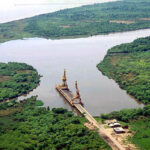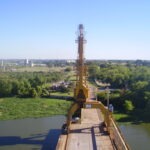La Plata
Quick Info
Charts Arg H-116 H -117 H-157
US 24050, 24052, 24055, 23030
La Plata is the capital of the province of Buenos Aires, and marks the Southern edge of the metropolitan area. It has a population of about 735.000 (including the Greater La Plata, with Berisso and Ensenada, where the port is). Being the seat of the provincial government there is great administrative activity and the city is also an important commercial and financial center. There is around the suburbs an important industrial activity. Some of the outstanding plants are the steel mill SIDERAR, the Repsol-YPF oil distillery, the Río Santiago shipyard, the COPETRO petcoke plant and several petrochemical plants. In the outskirts of La Plata there is also a belt of horticultural production. There are good road connections with all the province and a freeway joins La Plata directly with Buenos Aires. It has railway connections with the Nuevo Central Argentino, Ferrosur Pampeano and Buenos Aires with the Pacific. There is an airport served by domestic flights and the Buenos Aires airports (domestic and international) are 60 km away.




